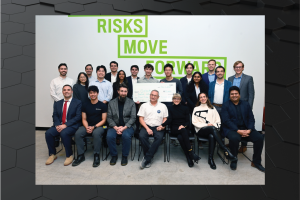
FastForward U’s annual Fuel Demo Day for its upper-level student venture accelerator was very different this year. In addition to the usual celebration of startups’ successes, the evening included special recognition of former student, a onetime FastForward U employee and successful startup founder Pava Marie LaPere.
Josh Ambrose, Fast Forward U’s director of student ventures, said, “We lost one of our strongest collaborators this semester. Pava’s influence is felt throughout our programming here at FastForward U. Many of you here tonight have directly benefited from the curriculum that she wrote, and she was a thoughtful adviser and partner for all our programming, wise and creative at every turn. A frequent visitor and a generous mentor, she met with our students pitching here tonight during their first week in the cohort and made a huge impression in just one meeting. She embodied the words we display on our wall better than anyone: ‘Take risks, move forward.’ Tonight, we invite our teams, our judges and our guests to consider: What would Pava do?”
LaPere’s family attended the Demo Day, and the entire room gave them a standing ovation in recognition of the impact LaPere had on everyone there.
More than 120 people attended the event in person and 70 joined online. Each team participating in the Fuel accelerator receives a $5,000 stipend, and teams are chosen to receive additional prize money. Attendees voted on their favorite venture to select the audience prize winner. At the end of the event, the grand prize, selected by the judges, and the cohort prize, were revealed.
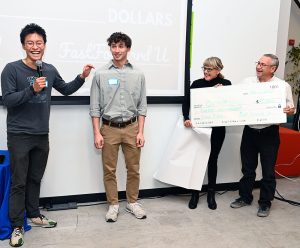
Orbit celebrating as Pava LaPere’s family presents their winnings.
Undergraduate team Orbit led by founders Colton El-Habr (Whiting School of Engineering) and Steven Pang (Georgetown University), won the grand prize of $12,000, which was selected by the four judges. Orbit develops integrative neurotechnology to enhance entertainment experiences, particularly in video games, by inducing the feeling of movement, even when sitting still.
The audience award of $5,000 went to Somnair, a new device for treating sleep apnea, led by a Johns Hopkins team founded by Phoebe Dijour, M.S.E., Anders Sideris, M.D., Shri Prabha Shrivam, M.S.E., and Mitchell Turley, M.S.. Sideris and Turley are Innovation Fellows at the Johns Hopkins Center for Bioengineering Innovation and Design (CBID). Shri is a research specialist and former teaching assistant at CBID.
The Cohort Prize of $3,000 was awarded to Aquapitas, a detection device used to locate leaking pipes in aging metropolitan water systems. The founding team members Alexander Rovalino, B.A., Kathy Cao, M.S.E, William Rong. M.S.E., Adriana Pena, M.S.E., are Johns Hopkins engineering students and graduates. Marketing strategist Ethan Hackmeyer studied at the University of Georgia.
All 10 teams in the cohort presented their pitches and then faced Q&A from a formidable panel of judges:
-
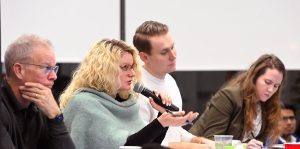
Demo Day judges (L to R): Brian Stansky, Margaret Roth Falzon, Tom Jaklitsch and Bailey Surtees
Margaret Roth Falzon, a leader in the Baltimore ecosystem and the chief operating officer of Squadra Ventures. A trusted friend of FastForward, she was an early collaborator on Pava’s early initiatives.
- Tom Jaklitsch, an accomplished tech startup founder and a longtime mentor to the program who traveled from New York City for the evening.
- Brian Stansky, who has decades of investment experience in telecom and life sciences, and just stepped down from his ten years as the director of FastForward. He employed Pava right after graduation and empowered her to help build the Spark curriculum.
- Bailey Surtees, an original student founder of FastForward U and the CEO of her startup Kubanda Cryotherapy. A close friend of Pava, she has served as a Baltimore-based mentor and innovation ecosystem advocate, meeting with student teams regularly.
The following are the 10 ventures:
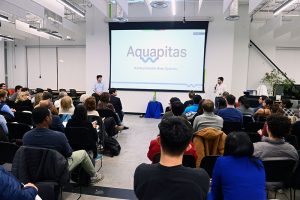 Aquapitas: Builds technology for water utilities to predict and prevent water main breaks by detecting pipe conditions in real-time with a free-swimming device.
Aquapitas: Builds technology for water utilities to predict and prevent water main breaks by detecting pipe conditions in real-time with a free-swimming device.- Cognitiv.ly: Leverages state-of-the-art, fine-tuned AI language models trained and optimized on thousands of electronic health record transcriptions and designed its product to extract and summarize insights from patient notes.
- CounselAI: A criminal attorney’s co-pilot assists in case investigation for high volume case discovery, leveraging AI to provide critical case analytics and to give clients the defense they deserve.
- Glycotan: OfferIng a groundbreaking solution to combat teeth staining, this venture’s vision is to re-define oral care routines, making teeth staining a concern of the past while ensuring a sustainable, health-conscious approach to oral hygiene.
- Medland: A peer-to-peer lending platform helps physicians facing financial barriers establish their medical practices, from acquiring advanced equipment to leasing clinic spaces.
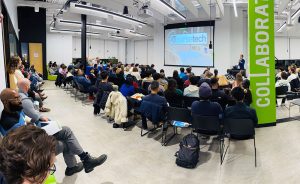 Nursetech: This venture developed the Cordflex device, which is a mobile, customizable, disposable clip that is quickly and easily attachable to multiple services and that organizes all standard tubes, cords, catheters, lines and cables. Designed for the intensive care unit (ICU) and other hospital settings, Cordflex makes cord management safer and 37% faster, saving ICUs approximately $100,000 yearly in time costs alone.
Nursetech: This venture developed the Cordflex device, which is a mobile, customizable, disposable clip that is quickly and easily attachable to multiple services and that organizes all standard tubes, cords, catheters, lines and cables. Designed for the intensive care unit (ICU) and other hospital settings, Cordflex makes cord management safer and 37% faster, saving ICUs approximately $100,000 yearly in time costs alone.- Orbit: Develops integrative neurotechnology to enhance entertainment experiences, particularly video games, by stimulating the vestibular system, which can create the feeling of movement, even when the user is sitting still.
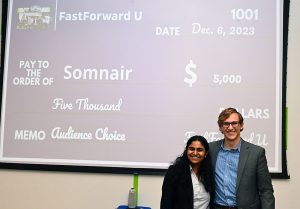 Owlsted: A platform seeking to revolutionize the way people learn by providing a personalized educational experience that adapts to the user’s needs and preferences.
Owlsted: A platform seeking to revolutionize the way people learn by providing a personalized educational experience that adapts to the user’s needs and preferences.- SmartTIVA: A closed loop anesthesia system provides greater safety and more individualized dosing.
- Somnair: Development of this new device/system for treating sleep apnea.
This fall, more than 40 Johns Hopkins University student ventures applied for the fall cohort of the Fuel accelerator — 25 were invited for interviews and 10 were selected. Fuel is a semester-long accelerator program that equips Johns Hopkins University student startups for long-term success and provides mentorship connection to a vast alumni network. The extracurricular program includes a focus on customer acquisition, marketing development and entrepreneurial finance, but most importantly, it is designed to support specific needs of the participating teams.
The cohort teams meet twice per week and engage with staff members, strategic advisors and industry mentors, in addition to 18 guest speakers. Each team is also connected with at least three mentors for one-on-one advising. The much-anticipated conclusion to each accelerator is Demo Day, during which teams showcase their technology and products to judges and an audience of entrepreneurs, investors, and supporters.
FastForward U’s accelerators run each semester. Fuel’s next application cycle is now open until the end of January 2024. The new cohort will begin in early February and will conclude at the end of the spring semester.